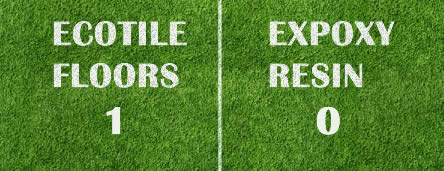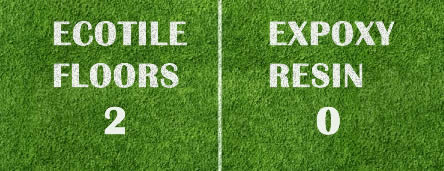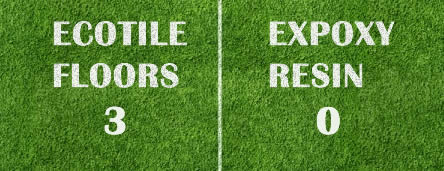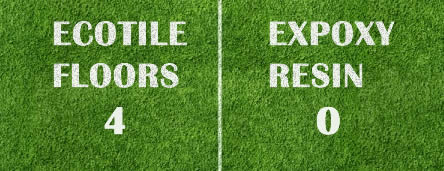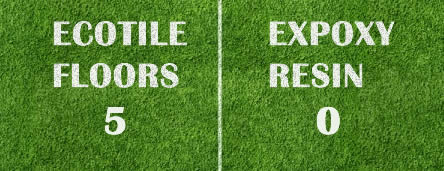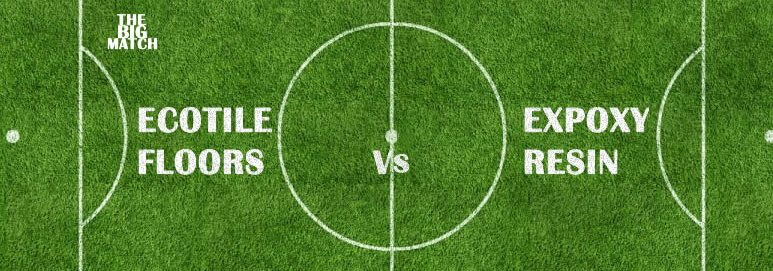
THE BIG MATCH: Ecotile Floors v Epoxy Resin Flooring
There is no arguing that an epoxy resin floor, when done professionally, can look truly amazing. The deep shine gives the floor a fantastic finish and can make it really stand out, especially when mixed with a striking colour.
However, many of our world leading industrial clients tell us that Ecotile’s unique flooring solution provides certain benefits that epoxy resin simply cannot compete with.
I know you’re thinking “Well you would say that wouldn’t you!” and you might decide that overall you’d still prefer the traditional resin route.
But before you do – why not take a minute or two to consider some of the advantages of our interlocking industrial flooring system over epoxy flooring.
At the very least we hope to help you ensure that you are making the very best flooring decision for you.
KICK OFF!
The benefits of a resin floor
Resin is tough. Added over a flat concreate surface it combines with the concrete to become a tougher substance than concreate by itself.
For industrial flooring it will range in thickness from 2 – 4mm for medium industrial applications, up to a whopping 9mm for heavy duty industrial requirements.
The resin protects the floor from damage to the concrete underneath from high impact or chemical spillage. It is easy to clean and can be given anti-slip properties when graded aggregates are added to the base layer.
In summary resin flooring is strong, safe, easy to look after, and provides a virtually impenetrable layer of protection.
Installation and maintenance – Epoxy flooring’s real drawback
Two pretty big factors these. And when it comes to installing and maintaining an industrial floor, two of the biggest considerations you need to make.
Let’s look at this from two different angles. Are you installing a brand new floor from scratch or are you looking to upgrade an existing floor? Let’s look at these one at a time.
Installing a new floor in an existing industrial factory, warehouse or unit
The biggest drawback for epoxy resin here is the fact that you have to move everything out of your building at the same time because it has to laid all at once rather than in stages.
You’ll have to shut everything down and empty the building. If you are a functioning business this makes it very difficult to achieve without losing money. If you have large machinery and loads of equipment this is going to cost you a fortune.
“Ecotiles can be laid around existing plant and machinery and you can even work a section at a time so your facility can continue making money while the floor is being laid.”
Next you need to prepare the substrate
This can often require stripping off an existing coating, which usually involves grinding. Needless to say the dust and mess this causes is considerable, to say nothing of the time and money.
If you are applying resin to a plain concrete floor you’ll have to make sure that it hasn’t absorbed any chemicals over the years and that it doesn’t contain any damp.
Don’t make the mistake of thinking this is optional. If any of these things are hidden deep in the concrete floor they will gradually rise to the surface and crack your beautiful resin floor within six months, unless you deal with them properly.
The professional way to do this is with HCA treatment. This is expensive and time consuming. Very expensive and very time consuming actually. And you haven’t even got started on the resin yet!
“Ecotiles can be laid directly over almost any surface so there is no need for expensive and time consuming preparation processes.”
HALF TIME SCORE
Installing a new floor in a brand new industrial factory, warehouse or unit
If you are applying resin to a brand new concrete floor you will have to wait for it to cure. The problem is that concrete cures at an agonisingly slow pace.
A 6cm thick layer of concrete requires 8 weeks to dry, and remember that a 6cm layer is not going to be thick enough for heavy plant machinery or forklift trucks, so this is the bare minimum. Realistically it can be up to one whole year before you can put anything on it.
Ecotiles have joints that let the moisture evaporate through them so you can safely put them straight down on a floor as soon as the surface is dry. The concrete will continue curing while you get on with setting up your facility. And as soon as they are down your new concrete floor is protected from the impact of vehicles and heavy machinery.
As you might be realising, putting down a resin floor requires expertise and time. Both of which cost you money and slow down your set-up times. Just getting your diaries in sync with the flooring contractors can take weeks.
“Many of our clients – including some of the biggest manufacturers in the world – simply have our tiles delivered and have them installed in stages as and when it suits them.”
Why an Ecotile floor is so much easier to maintain than an epoxy resin floor
Concrete floors are fitted in slabs and use expansion joints between them to allow them to move. Eventually this movement effects even the best laid resin floors and cracks will start to appear. Once this happens it is never the same again.
You could try to fix it and hope no-one notices but the reality in a busy industrial environment is that once it is there it will only get worse as heavy goods, forklifts and pallet trucks impact on it daily.
In the end it becomes a serious safety issue. Materials and time spent fixing it quickly add up.
“Ecotile wins huge contacts because it is so much cheaper to maintain and repair. If you damage a tile you just pull it up and can have another one laid in less than 5 minutes.”
INTO INJURY TIME!
Sustainability and the environment – how green or sustainable is an epoxy resin floor compared to Ecotile?
The properties of epoxy resin vary but overall you are working with strong, potent chemicals. Should at some point in the future you choose to pull up your floor you will have no choice but to strip it off and throw it away – so they do leave quite a large footprint on the environment.
In contrast Ecotile’s can be easily removed at any time thanks to their unique interlocking flooring system. We also offer to collect our old tiles as we like to melt then down and reuse them to produce the new generation of Ecotiles. So from a sustainability perspective we offer a much better solution.
FINAL SCORE
“Epoxy Resin Flooring – looks like you’re getting sacked in the morning!”
For further information or to speak to one of our industrial flooring specialists call on (+44) 01582 788232 or email us.

David Bryant-Pugh is sales and marketing manager of Ecotile Flooring. A Member of the Chartered Institute of Marketing (MCIM), David divides his time between creating strategy and tactics for the modular flooring business, and meeting customers to better understand their needs and specific marketplace. Operating across multiple industry sectors (every business has a floor, right!) David’s experience ranges from manufacturing to retail, and everything in between.
Prior to Ecotile, David managed the marketing team at Argos for Business. He previously built a wealth of experience in the foodservice and construction industries as marketing lead. You can find David on LinkedIn
